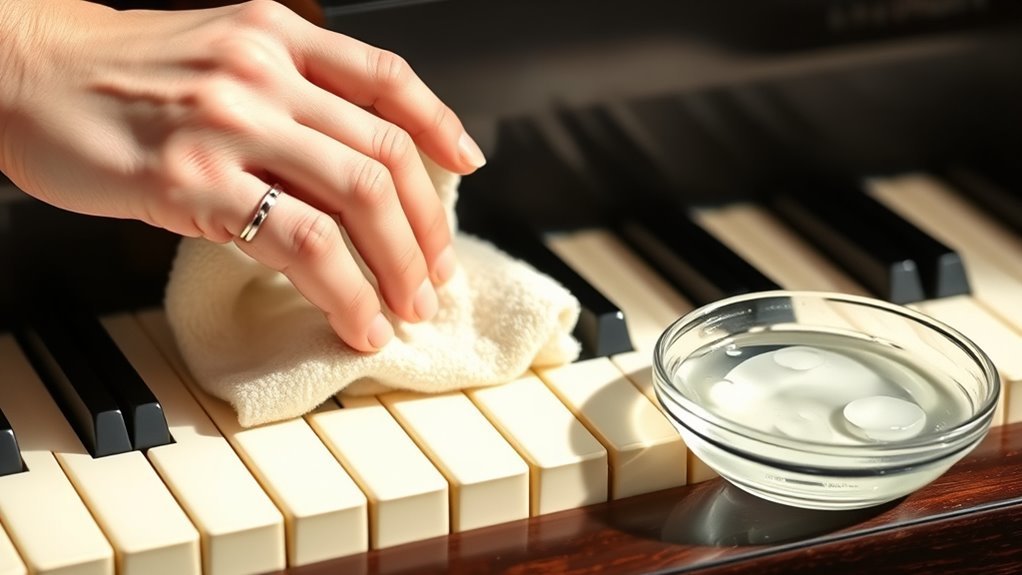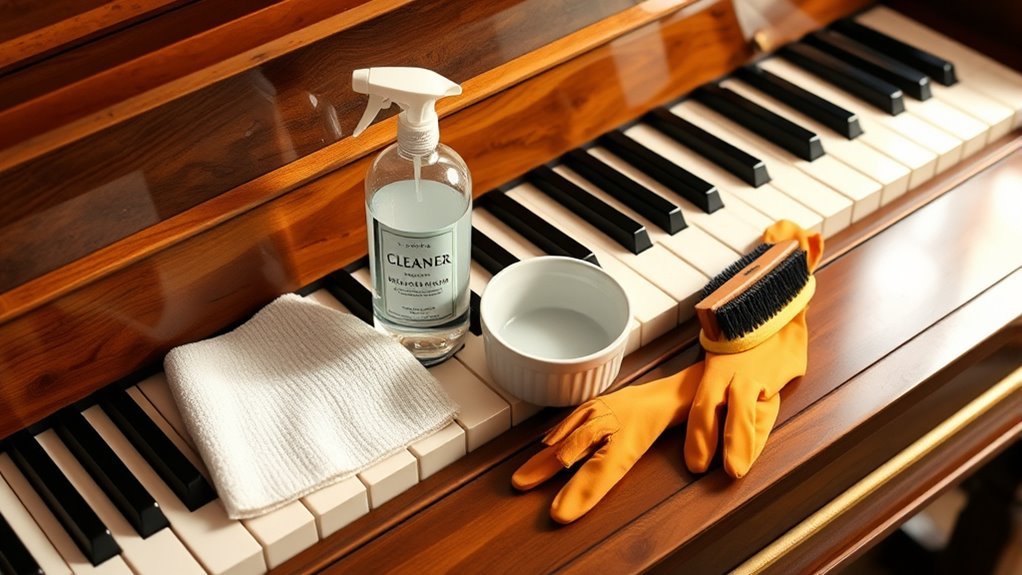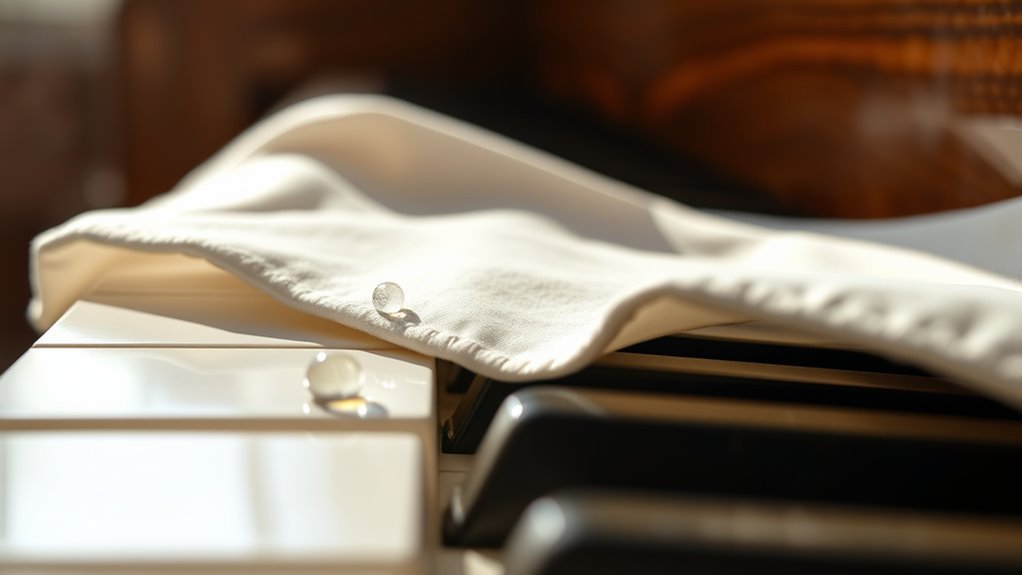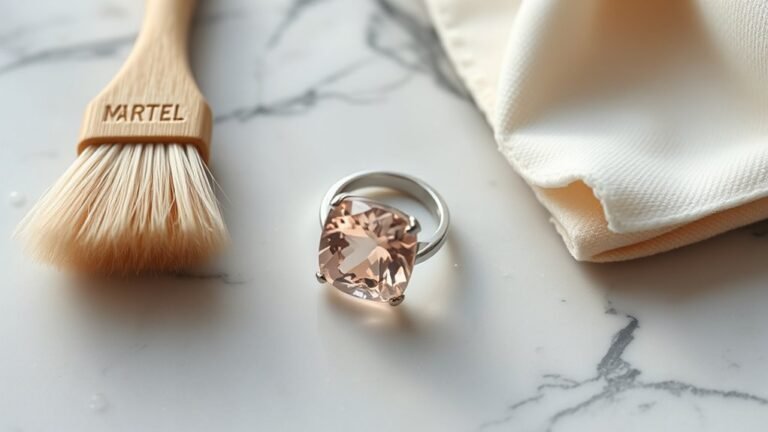How to Clean Piano Ivory Keys
To clean your piano’s ivory keys, gather soft microfiber cloths, distilled water, and a mild pH-neutral soap. Dampen a cloth with your cleaning solution, then wipe the keys from the center to the edges. Avoid excess moisture and dry the keys with a clean, dry cloth afterward. Always wear gloves, test any solution on a small area first, and keep your piano in a stable environment to maintain cleanliness. Discover more detailed techniques to keep your keys pristine.
##

If you’re looking to clean your piano’s ivory keys while preserving their beauty and integrity, you’ve come to the right place. In this article, we will provide you with essential tips and step-by-step instructions to ensure that you effectively maintain your piano without causing any damage to the delicate ivory material. You’ll learn about the best cleaning methods, the right tools to use, and how to approach the task with care. By following our guidance, you’ll be able to keep your piano looking pristine and functioning beautifully for years to come.
Preparation For Cleaning
Before diving into the cleaning process, it’s essential to gather the right materials and set up your workspace effectively. Start by making sure you have a clean, flat surface to work on, free from clutter. Consider using a soft microfiber cloth, distilled water, and a gentle pH-neutral cleaner suitable for ivory. Familiarize yourself with various cleaning methods, as each can greatly impact key maintenance. You’ll also want to check if your piano has specific recommendations from the manufacturer regarding cleaning. This preparation not only makes the cleaning process smoother but also helps prevent potential damage to your ivory keys. By taking these steps, you’ll guarantee a successful and safe cleaning experience for your piano’s delicate keys.
Tools and Chemical Required

Having gathered your materials and set up your workspace, it’s time to identify the specific tools and chemicals necessary for cleaning your piano’s ivory keys. You’ll need a few essential cleaning tools and effective cleaning solutions to guarantee your keys are restored without damage.
Here’s a quick reference table to help you:
| Tool/Chemical | Purpose |
|---|---|
| Soft microfiber cloth | Wiping and buffing |
| Distilled water | Gentle cleaning solution |
| Mild soap (pH-neutral) | Removing stains |
| Soft brush | Dusting hard-to-reach areas |
| Vinegar (diluted) | Disinfecting and deodorizing |
Using these cleaning tools and solutions will help maintain the integrity and appearance of your ivory keys.
How to Clean:

Step 1: Gather Your Cleaning Supplies
- Microfiber Cloths: Use soft microfiber cloths to avoid scratching the keys.
- Distilled Water: This helps prevent mineral buildup from tap water.
- Mild, pH-Neutral Soap: Choose a gentle soap that won’t harm the ivory.
- Specialized Ivory Cleaner (Optional): For tough stains, consider a product specifically made for cleaning ivory.
Step 2: Prepare Your Cleaning Solution
- In a small bowl, mix distilled water with a few drops of mild, pH-neutral soap.
- Ensure the solution is well mixed, but do not create excessive bubbles.
Step 3: Dampen the Cloth
- Take one of your microfiber cloths and gently dampen it with the cleaning solution.
- Wring the cloth out thoroughly to avoid excessive moisture, which can damage the piano.
Step 4: Clean the Keys
- Start by wiping each key from the center towards the edges. This technique prevents dirt from being pushed into the seams of the keys.
- Work methodically, cleaning one key at a time to ensure a thorough job.
Step 5: Dry the Keys
- After cleaning each key, use a clean, dry microfiber cloth to remove any remaining moisture.
- Ensure that no dampness remains on the keys to prevent damage.
Step 6: Address Stubborn Stains
- For any stubborn stains, consider using specialized cleaning methods designed for ivory.
- Always follow the manufacturer’s guidelines when using these products to ensure safe application.
Step 7: Incorporate into Maintenance Routine
- Make this cleaning process a part of your regular piano maintenance schedule.
- Frequent cleaning will help prolong the life of your keys and maintain their appearance.
Step 8: Avoid Excessive Moisture
- Remember to always avoid using excessive moisture, as it can harm the underlying materials of the piano.
- Keeping your keys clean not only improves their appearance but also enhances the overall sound quality of your instrument.
Safety Consideration

Cleaning your piano ivory keys not only enhances their appearance but also requires some safety considerations to protect both you and your instrument. Before you start, make sure you’re wearing protective gear, such as gloves and safety goggles, to safeguard against any cleaning agents you may use. It’s essential to choose non-toxic, gentle cleaners to avoid damaging the ivory. Always test any solution on a small, inconspicuous area first to check for adverse reactions. Additionally, keep your workspace well-ventilated to minimize inhalation of fumes. Finally, make sure the piano is unplugged if it has electronic components. By following these safety precautions, you’ll not only clean effectively but also maintain a safe environment for both you and your cherished instrument.
Tips to keep clean for long time
While regular cleaning is essential for maintaining the beauty of your ivory keys, implementing a few preventative measures can help keep them looking pristine for a longer time. Start with preventive maintenance by placing your piano in a controlled environment, away from direct sunlight and humidity. This helps prevent discoloration and warping. Make it a habit to conduct regular inspections, checking for dust accumulation or any signs of wear. When playing, consider using clean, dry hands to minimize oils and dirt transfer. Additionally, keep the piano covered when not in use to protect it from debris. By following these steps, you can greatly extend the life and appearance of your ivory keys, allowing them to shine beautifully for years to come. Regularly wiping surfaces and maintaining a consistent cleaning routine also helps prevent buildup and keeps the keys in optimal condition.
Frequently Asked Questions
Can I Use Vinegar to Clean Ivory Piano Keys?
You shouldn’t use a vinegar solution to clean ivory piano keys. While vinegar is a common cleaning agent, its acidic properties can damage the delicate surface of ivory. Instead, consider using a gentle soap and water mixture for safe cleaning. Remember to apply the solution to a soft cloth first, avoiding excess moisture on the keys. Following these cleaning tips will help preserve the integrity and appearance of your piano’s ivory keys.
How Often Should I Clean My Piano Keys?
Think of your piano keys as the heartstrings of your instrument; they need regular care. Ideally, you should establish a cleaning schedule, tackling key maintenance every few weeks. Dust and grime can build up, affecting both aesthetics and sound quality. If you play frequently, a more frequent regimen may be necessary. Remember, consistent care not only preserves the beauty of your keys but also enhances your instrument’s performance, allowing you to play freely.
Will Cleaning Damage the Ivory Finish?
Cleaning won’t damage the ivory finish if you use proper cleaning techniques. It’s crucial to prioritize ivory preservation by avoiding harsh chemicals and excessive moisture. Instead, opt for a soft, dry cloth, lightly dampened if necessary, to gently wipe the keys. Regular maintenance helps prevent buildup without compromising the delicate surface. Always test any cleaning solution on a small area first to make sure it won’t harm the ivory.
Can I Use a Steam Cleaner on Ivory Keys?
You shouldn’t use a steam cleaner on ivory keys. While steam cleaners promise thorough cleaning, their heat and moisture can compromise the delicate ivory, potentially causing damage. For ivory key care, it’s essential to prioritize safety over convenience—remember, some things are too precious to risk. Instead, opt for gentle cleaning methods that preserve the integrity of your piano. Your instrument deserves the best treatment to guarantee its beauty and functionality endure.
What Should I Do if Keys Are Sticky?
If your keys are sticky, first identify the source of the sticky residue. It might be dirt or oils from your fingers. For key maintenance, gently wipe the keys with a soft, damp cloth, avoiding excessive moisture. If the stickiness persists, consider using a small amount of mild soap diluted in water. Always dry the keys thoroughly afterward to prevent damage. Regular maintenance will help keep your piano in prime condition.






